How The Republican Push To Restrict Voting Could Affect Our Elections
In the aftermath of the 2020 election, Republican lawmakers have pushed new voting restrictions in nearly every state. From making it harder to cast ballots early to increasing the frequency of voter roll purges, at least 25 new restrictive voting laws have been enacted, with more potentially on the horizon. The GOP has introduced such measures in the name of “election integrity,” but at the heart of this effort is former President Donald Trump’s baseless claim that the 2020 election was stolen from him.
“I liken it to a quack doctor holding up an X-ray, pointing to something going, ‘See, see, see?’ and getting the person to believe that there’s something really there on that X-ray that requires expensive and dangerous surgery,” said Carol Anderson, a professor of African American studies at Emory University, of Republican efforts to pass new voter restrictions even though there is no evidence of voter fraud in the election. “We had an election that was amazing in the midst of a pandemic. And instead of applauding themselves for it, they went with a Trumpian lie.”
Understanding how new voting restrictions will influence our elections is difficult. Political science hasn’t found that these types of laws have that big of an effect, at least as individual measures. But, while laws that make it more taxing to vote are not new, the current onslaught of voting restrictions and changes to how elections will be administered is not something we’ve grappled with on this scale. Additionally, there is their nakedly partisan origins — nearly 90 percent of the voting laws proposed or enacted in 2021 were sponsored primarily or entirely by Republican legislators — and the fact that these laws are likely to have a greater impact on Black and brown voters, who are less likely to vote Republican.
Republican efforts to pass new voter restrictions have been so aggressive and widespread that their effects are hard to predict. Elections, moreover, don’t run themselves; they’re run by people. And these new laws point to an even more troubling problem that threatens to undermine our democracy: the GOP’s eroding commitment to democratic values, like free and fair elections. In many ways, the most concerning change our elections face may not be any one law, but rather the GOP’s increased willingness to take such anti-democratic actions.
Republicans can govern without winning a majority. That threatens our democracy.
The research on voting restrictions
Political scientists have for years studied the effects of voting laws on turnout, including what kind of policies make it easier (or harder) to vote and who is most affected by changing the rules. Take voter ID laws, which have long been a preoccupation of the GOP. Today, legislation to expand their use is once again on the rise. In fact, voter ID laws are the second-most-common type of restriction lawmakers are pushing right now, according to analysis from the Brennan Center for Justice, trailing only new restrictions on absentee voting.
Such laws are controversial because not everyone has government-issued photo ID, and access to getting one can be a serious barrier. Still, research has not conclusively linked voter ID laws to a decrease in turnout — one recent review found that such laws generally produce, at most, only a slight reduction. The research also disagrees as to whether such laws substantially decrease turnout among people of color.
But trying to distinguish the effects of only one type of restriction, like voter ID requirements, is challenging because a new election law rarely changes only one voting provision. “The actual effect is difficult to measure, not because it doesn’t exist, but because these laws are not enacted in a vacuum,” said Bernard Fraga, a political scientist at Emory University who studies the relationship between race and voter turnout. Fraga pointed to the new Georgia law, noting it includes “a bundle of different policies” that make it hard to isolate the impact of one provision. For instance, the law requires voters meet a new strict ID requirement when trying to vote absentee and limits voters’ ability to cast a provisional ballot if they show up to vote at the wrong precinct, among other things.
How voters respond to these restrictions also complicates our understanding of the size of the effect of these laws. Some researchers have found evidence of a backlash effect where turnout increases, potentially neutralizing the effects of voting restrictions. “There’s a concerted effort by organizations that are leading the charge against these laws to mobilize voters, to inform voters about their rights and make sure that they’re as informed as possible regarding the changes they need to make in order to vote,” said Fraga.
Yet while voters are sometimes able to overcome hurdles, these hurdles still have a cost. Efforts to mobilize and educate citizens to vote despite new restrictions costs time and money — and each new round of restrictions means more time and more money.
On the question of how easy (or hard) it is for Americans to vote, political scientists Quan Li, Michael J. Pomante II and Scot Schraufnagel have tried to answer this question via their “cost of voting index,” which evaluates state voting guidelines in their entirety — from the strictness of voter ID laws to how easy it is to vote absentee. They found that states with fewer barriers to access see higher rates of voter participation, even after taking into account other factors, such as education level and race. The higher a state’s cost of voting, researchers found, the lower its turnout has tended to be in presidential contests since the mid-1990s.
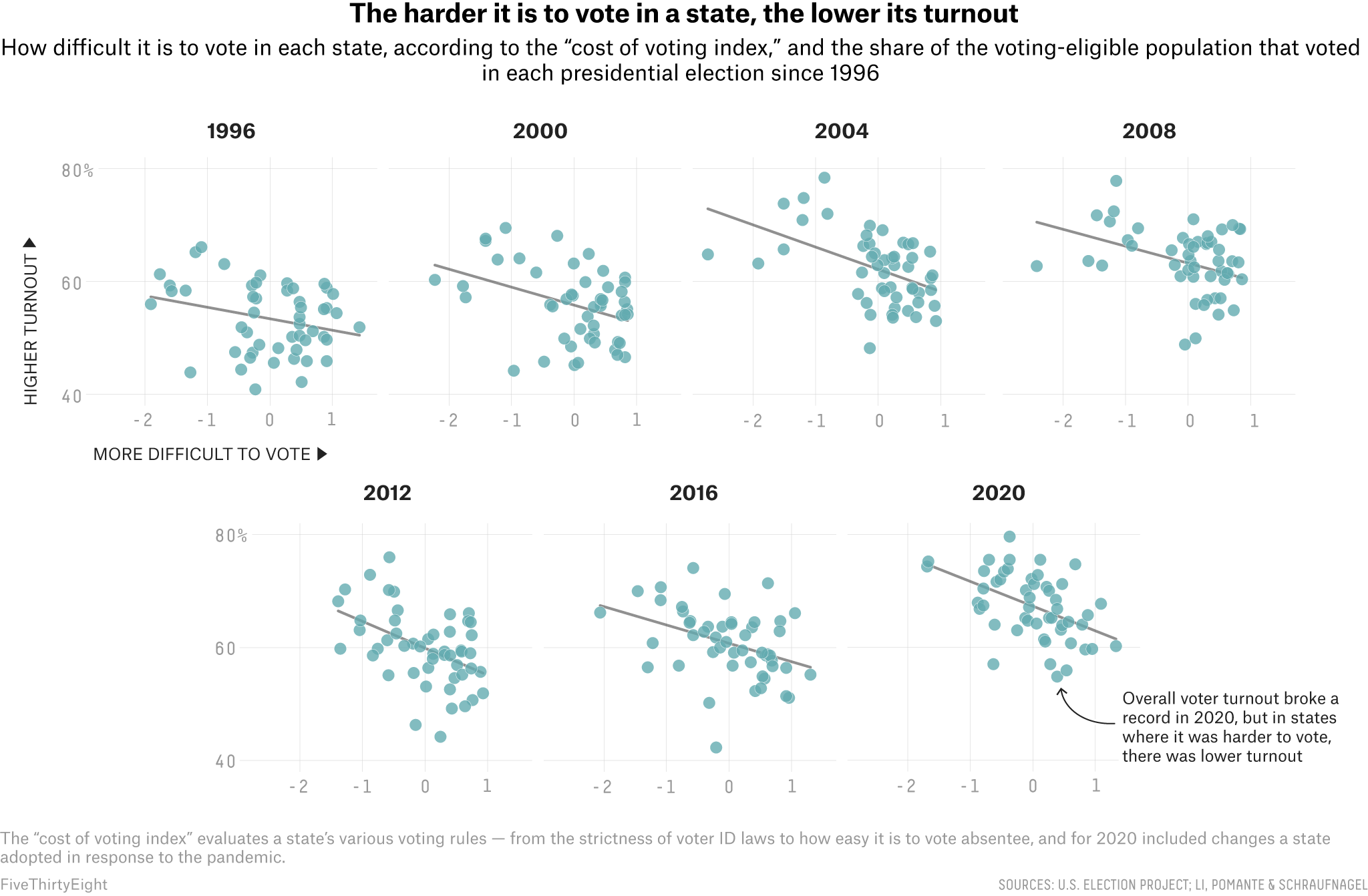
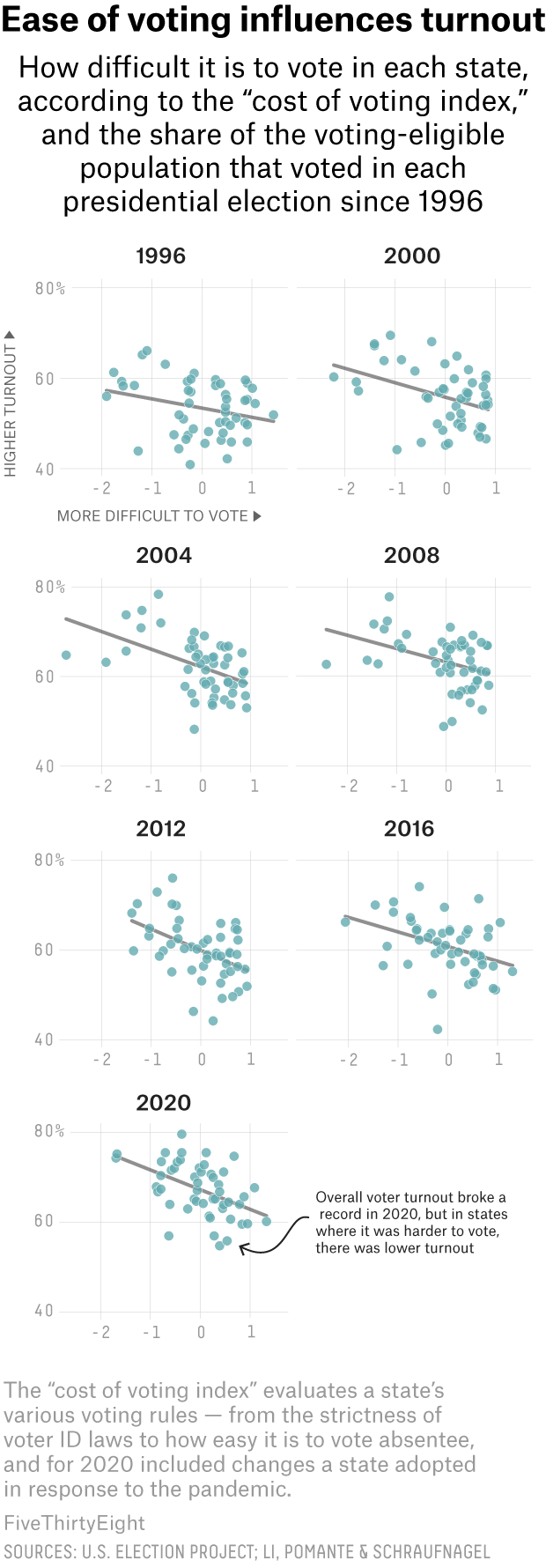
So while measuring the effect of a single voting rule can be challenging, put together, the cost of voting index suggests that a state’s collection of election laws does influence voter turnout, with more restrictions leading to lower turnout overall.
Schraufnagel, who studies the relationship between voting laws and participation at Northern Illinois University, told me that while he and his colleagues are confident that their metric helps predict voter turnout, they’re less certain about how different voting laws help or hurt a political party’s performance. For instance, Schraufnagel noted that in states where turnout increased more from 2016 to 2020, Trump actually tended to do slightly better in 2020 compared to his 2016 margin.
This cuts against the longstanding conventional wisdom that higher turnout is good for Democrats and bad for Republicans. The 2020 election and its record-setting turnout cast serious doubt on Trump’s (frankly absurd) claim last year that if voting was expanded, “you’d never have a Republican elected in this country again.” President Biden only narrowly won and Democrats lost a number of House seats. “Anyone who presumes that making voting easier has some sort of across-the-board partisan advantage that benefits the Democratic Party is misunderstanding the facts,” said Schraufnagel.
So in the long run, additional barriers to voting could actually hurt Republicans, dampening turnout among white voters without a college degree, who have become a huge part of the GOP base. Fraga told me this is why he thinks “the polarization on voting access by party” — where Democrats generally favor making it easier to vote while Republicans oppose it — “seems totally backwards.”
If Rep. Liz Cheney doesn’t have a home in the GOP, who does?
To be sure, though, Fraga’s own research has found that white voters, regardless of how easy or hard it is for them to vote, consistently turn out at higher rates than voters of color, so we do want to be careful of not reading too much into this. Jennifer McCoy, a political scientist at Georgia State University who studies the effects of polarization on democracy, told me that she thought the current emphasis on voter restrictions boiled down to Republicans thinking they could appeal to Trump’s base by codifying his baseless claims of voter fraud. “[Republicans] know they have to attract Donald Trump supporters who now believe there is fraud,” said McCoy. “So a large part of the current efforts to change voter laws was a direct response to this last election.” Large majorities of Republicans continue to believe Biden’s win is not legitimate, and a March survey by the Pew Research Center found that only 28 percent of Republicans and Republican-leaning people agreed that “everything possible should be done” to make voting easy, a steep drop from 48 percent in October 2018.
Republicans have in the past backed efforts to expand absentee voting, but notably, their urgency to restrict its use now seems to be not just about doing Trump’s bidding, but also about targeting battleground states where there were record levels of enthusiasm for absentee voting among voters of color. “Georgia has had no-excuse absentee ballots since 2005. It is only after this was the first election when African Americans overwhelmingly used absentee ballots that now it becomes a problem that has to be solved,” said Anderson.
The GOP’s restrictionist bent sends the message that Republicans don’t want Black and brown Americans to vote. In September 2020, 54 percent of Black respondents and 35 percent of Hispanic respondents told FiveThirtyEight/Ipsos they believed Republicans didn’t want “people like me” to vote.
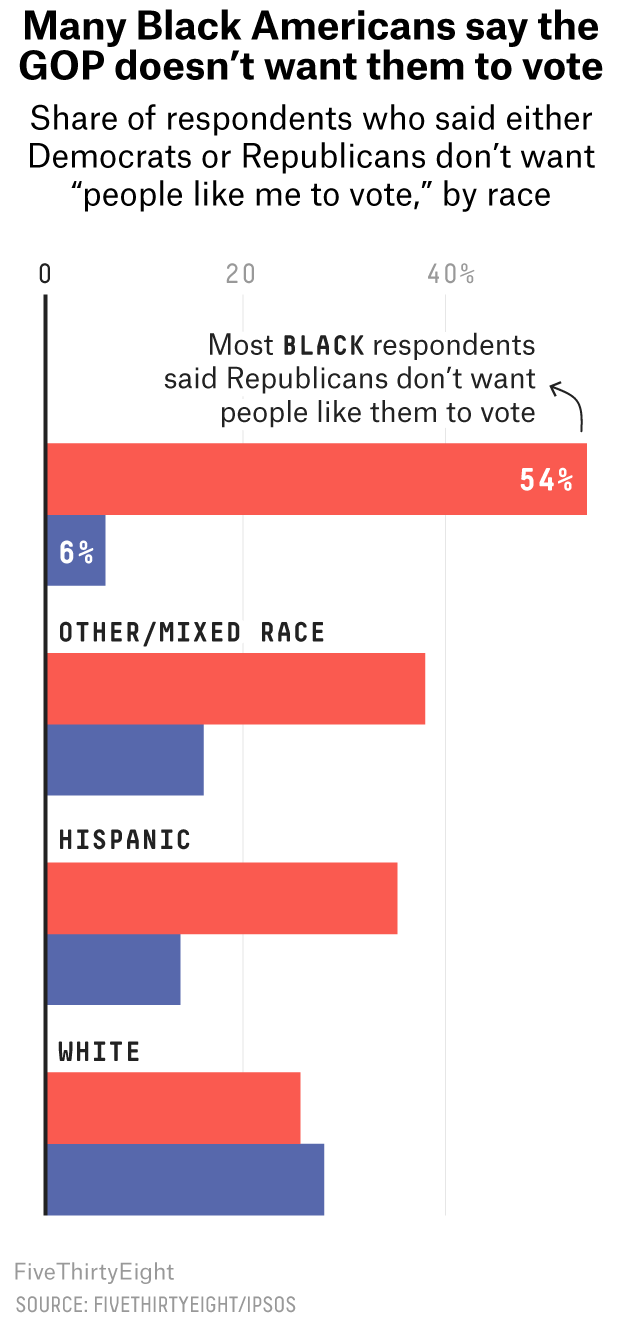
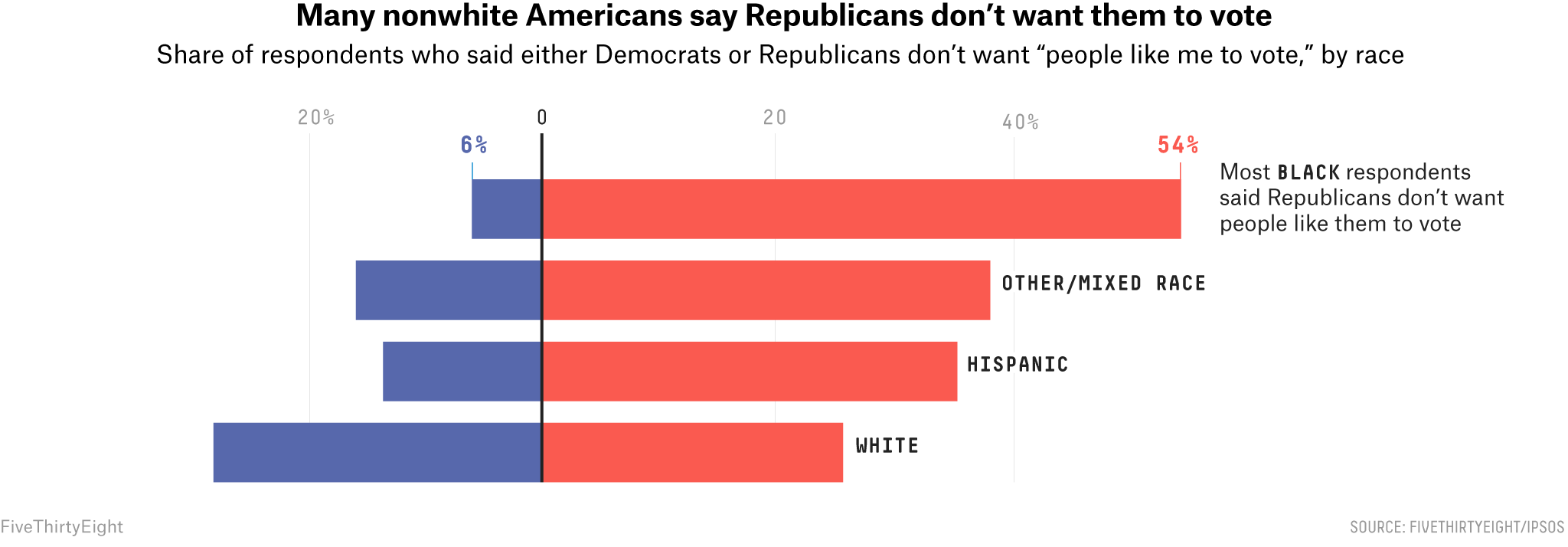
But those numbers become even more understandable when we consider the GOP’s history with limiting voting access. In our conversation, Anderson cited an infamous quote by the late conservative political operator Paul Weyrich that sums up the mindset of many Republicans to this day. “I don’t want everybody to vote,” he said in 1980. “As a matter of fact, our leverage in the elections quite candidly goes up as the voting populace goes down.”
And with that in mind, election fraud has grown into what Benjamin Ginsberg, longtime attorney for Republican Party organizations and officials, has called the GOP’s “Loch Ness Monster” — something Republicans forever search for, even though it doesn’t exist. But that search has greatly influenced our election laws, as Anderson told me “the lie of voter fraud is what provides the rationale” for voting restrictions.
The Republican-led push for restrictive voting laws isn’t new
Indeed, Republican politicians have argued for years — contrary to all evidence, and long before the advent of Trump’s “Big Lie” — that voter fraud is a major problem. As a result, Republican voters already had somewhat bought into the idea of the importance of “election integrity” before Trump came along and exacerbated that belief by making false claims about illegal votes and election-rigging.
In fact, Republican-controlled state governments have spent the last two decades attempting to pass laws to implement “strict” photo ID rules, which unlike some voter ID laws make no exceptions for identification; you either have a photo ID or you don’t.
Furthermore, if you don’t have a photo ID and cast a provisional ballot, you must bring a photo ID shortly thereafter to election officials to ensure that your vote counts.
” data-footnote-id=”1″ href=”https://fivethirtyeight.com/#fn-1″>1 The National Conference of State Legislatures has been tracking the evolution of voter ID laws, and of those they’ve categorized as “strict photo ID” since the mid-2000s, the laws — some of which were shot down by the courts or never implemented — have almost entirely been pushed by Republican state legislatures and governors.
Only Republicans are pushing voter ID laws
Which states have adopted “strict photo ID” laws by party control of state legislature and governorship at time of passage
| Party control when passed | |||
|---|---|---|---|
| Year | State | Legislature | Governor |
| 2005 | Georgia | R | R |
| 2005 | Indiana | R | R |
| 2006 | Missouri* | R | R |
| 2011 | Alabama† | R | R |
| 2011 | Kansas | R | R |
| 2011 | Tennessee | R | R |
| 2011 | Texas* | R | R |
| 2011 | Wisconsin | R | R |
| 2012 | Mississippi | R | R |
| 2012 | Pennsylvania* | R | R |
| 2013 | Arkansas*‡ | R | D |
| 2013 | North Carolina* | R | R |
| 2013 | Tennessee | R | R |
| 2013 | Virginia | R | R |
| 2015 | North Dakota | R | R |
| 2021 | Arkansas | R | R |
Importantly, this list does not include states where photo ID is not absolutely required to vote, but in some states, those laws are nearly as strict. For instance, Wyoming just passed a law requiring voters to show identification to cast a ballot, and the only forms of acceptable ID that don’t include a picture are Medicare and Medicaid insurance cards.
The first states to pass strict photo ID laws did so in the mid-2000s, not long after Congress passed the Help America Vote Act of 2002, which was meant to address deficiencies in the electoral system exposed by the 2000 election. HAVA did require those who registered to vote by mail to present some form of identification (not necessarily photo ID) when they voted for the first time. However, several GOP-controlled states then proposed far more stringent ID requirements than the law recommended and applied them to all would-be voters. In some states with a history of racial discrimination, the Justice Department held up the implementation of these laws. But immediately after the Supreme Court in 2013 curtailed the oversight provisions of the Voting Rights Act in Shelby County v. Holder, states like Alabama, Mississippi and Texas — which had previously been required to obtain federal approval to change their voting laws — started enforcing their own laws.
“I think Shelby is going to go down in history the way the Plessy v. Ferguson decision has,” Anderson told me, referencing the infamous 1896 Supreme Court decision that established the racist doctrine of “separate but equal.” She pointed to how GOP-controlled states have moved to restrict eligibility of certain forms of ID in ways that particularly affect people of color. For instance, Alabama’s ID law doesn’t permit the use of government-issued public housing ID, which Black Alabamians are more likely to have. And North Carolina’s 2013 law was so blatant an attempt to restrict voting access for Black Americans that a federal court overturned the law in 2016, writing that the law had targeted Black voters in the state “with almost surgical precision.”
Though the North Carolina law was overturned, it underscored that tougher voter ID laws are just one part of Republicans’ multipronged effort to create new voting hurdles that are more likely to affect people of color. In addition to new restrictions in deep-red states like Arkansas, Republicans are also targeting more competitive states like Georgia and Florida, where new rules do things like restrict after-hours access to absentee ballot drop boxes even though people of color are more likely to work irregular schedules and are less likely to have access to easy transportation.
These new laws in states with large numbers of voters of color follow what Fraga has found in his research: States with large, highly engaged groups of minority voters — especially Black voters — are more likely to pass new voting restrictions. Fraga noted Georgia, which is about one-third Black, particularly fits this pattern, as its new law came on the heels of Black voters helping put Democrats over the top in both the 2020 presidential race and the state’s two 2021 Senate runoffs.
The dangerous new frontier:
interfering with election results
The Georgia law has received ample attention for its restrictive voting rules, but it also captured headlines because of provisions that could make administering elections more susceptible to partisan interference. The law removed the secretary of state from Georgia’s State Election Board and gave the GOP-controlled state legislature control over appointing the board’s chair. It also empowered the Republican-controlled
The law states that the state legislature can appoint three election board members, the state Republican Party can appoint one and the state Democratic Party can appoint one. The legislature, however, is controlled by Republicans and likely will be for the foreseeable future.
” data-footnote-id=”2″ href=”https://fivethirtyeight.com/#fn-2″>2 state board to suspend county election officials and appoint temporary replacements.
It’s hard to view the first change as anything other than a clear rebuke of Republican Secretary of State Brad Raffensperger, who rejected Trump’s request to interfere in the 2020 election. To be sure, there are some guardrails to prevent abuse, like eligibility requirements that prevent the appointment of a recent candidate or party official as chair of the state election board, but these changes crack open the door to potential interference in the local administration of elections. And who is to say future malevolent actors won’t break it off its hinges, given Trump’s repeated refusal to accept defeat and widespread disbelief among Republicans that Biden did win?
McCoy, who studies democratic backsliding, told me the changes to rules affecting local election administration fit broadly into the sorts of approaches authoritarian parties in other countries have used to target regions where the opposition is stronger. “They will usurp the authority of those local elected officials, either by creating parallel administrative structures, and/or by controlling revenue flows to them and basically cutting them off,” she said.
She noted that in Georgia, the GOP-controlled state board could use its power to replace officials in heavily Democratic — and Black — counties such as Fulton and DeKalb around Atlanta. And worryingly, what’s happened in Georgia is also bubbling up in a dozen other states where Republicans have proposed legislation that could undermine local control over elections. A pair of new laws in Arkansas, for instance, puts local election officials more under the thumb of Republican-controlled state and county boards of election.
Regardless of the partisanship of the county, each county election board has two members from the statewide majority party and one from the statewide minority party, which currently gives every county elections board a 2-1 Republican majority.
” data-footnote-id=”3″ href=”https://fivethirtyeight.com/#fn-3″>3 Meanwhile, Iowa has made it a felony for local officials to fail to perform their duties or disobey guidance from the secretary of state, who is currently a Republican, and implemented $10,000 fines for “technical infractions” of election law.
Collectively, these developments point to the democratic backsliding we’ve already seen in Republican-controlled states over the past couple of decades. From 2000 to 2018, the most significant predictor of eroding democratic health in a state was whether Republicans ran the state government, according to a study by Jacob Grumbach of the University of Washington. And in the aftermath of the 2020 election, we’ve only seen this come into clearer focus, as Republicans in states Biden carried sought to void the results or proposed legislation to make that possible in the future.
In fact, the V-Dem Institute at the University of Gothenburg in Sweden released data last year aggregating political scientists’ measures of the democratic commitment of political parties around the world. As the chart below shows, in the U.S., the GOP has moved entirely in the wrong direction over the past half century.
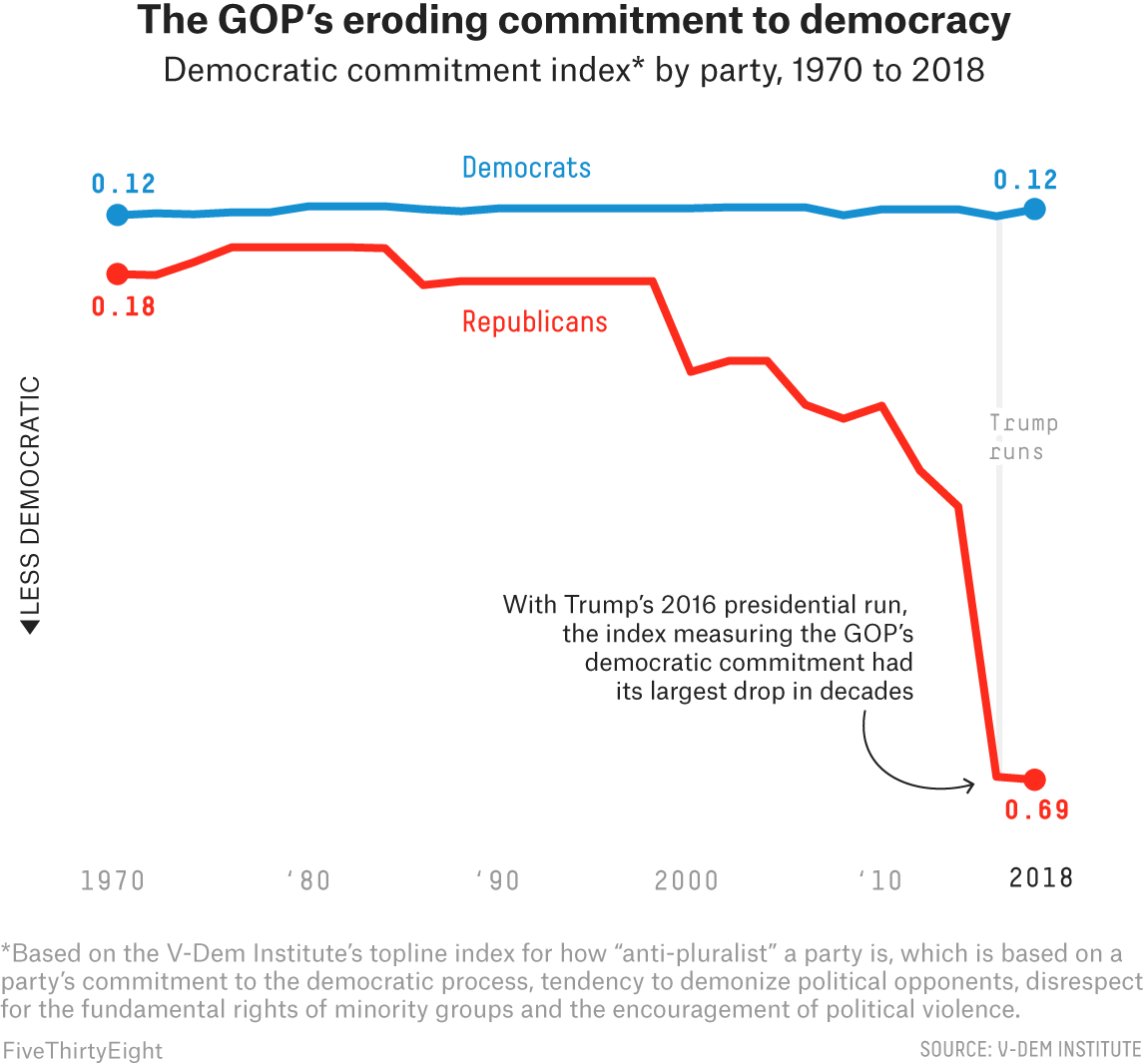
Prior to 2000, Republicans and Democrats didn’t score all that differently on their “small-d” democratic attitudes. But with Trump’s 2016 run, the index measuring the GOP’s democratic commitment fell by more than half. And although the V-Dem party data only runs through 2018, the Republican score may only further deteriorate once it is updated to account for the 2020 election, the scholars who developed the measure told The Washington Post last November.
For McCoy, this all ties back to the GOP’s response to the country’s sharp political polarization. “The deep ‘us-versus-them’ polarization can create a perception that the other political camp is a threat to the nation,” McCoy told me. “And that can lead citizens as well as political parties to believe that they must do anything — including violating democratic norms — to keep themselves in power or to gain power and get the other people out.”
To be sure, both Democrats and Republicans are focused on winning elections, but it is the GOP that has gone so far as to pursue electoral rule changes with the goal of more easily winning with minority support — despite the fact it already can win with minority support because of its edge in American political institutions such as the U.S. Senate and the Electoral College.
“In theory, parties should be trying to win more voters,” said Fraga. “They should be trying to get more people to vote for them, period. That’s democracy.” But an existential worry about losing power, exacerbated by Trump’s “Big Lie,” appears to be driving the GOP’s latest voting restriction push. And even if the research we have to understand the consequences of these new voting restrictions points to only modest effects, the cumulative effect still puts democracy at risk.

